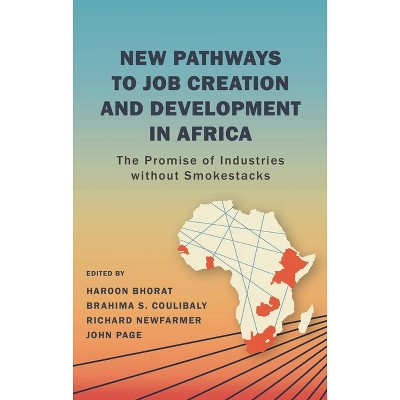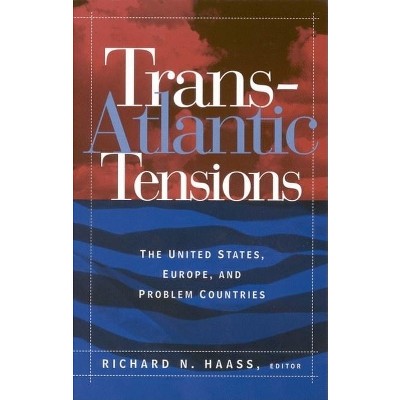Sponsored

The Siberian Curse - by Fiona Hill & Clifford G Gaddy (Paperback)
In Stock
Sponsored
About this item
Highlights
- "Can Russia ever become a normal, free-market, democratic society?
- About the Author: Fiona Hill is a senior fellow in the Foreign Policy Studies program at the Brookings Institution.
- 303 Pages
- Business + Money Management, Economics
Description
About the Book
"Can Russia ever become a normal, free-market, democratic society? Why have so many reforms failed since the Soviet Union's collapse? In this highly-original work, Fiona Hill and Clifford Gaddy argue that Russia's geography, history, and monumental mistakes...
Book Synopsis
"Can Russia ever become a normal, free-market, democratic society? Why have so many reforms failed since the Soviet Union's collapse? In this highly-original work, Fiona Hill and Clifford Gaddy argue that Russia's geography, history, and monumental mistakes perpetrated by Soviet planners have locked it into a dead-end path to economic ruin. Shattering a number of myths that have long persisted in the West and in Russia, The Siberian Curse explains why Russia's greatest assets--its gigantic size and Siberia's natural resources--are now the source of one its greatest weaknesses. For seventy years, driven by ideological zeal and the imperative to colonize and industrialize its vast frontiers, communist planners forced people to live in Siberia. They did this in true totalitarian fashion by using the GULAG prison system and slave labor to build huge factories and million-person cities to support them. Today, tens of millions of people and thousands of large-scale industrial enterprises languish in the cold and distant places communist planners put them--not where market forces or free choice would have placed them. Russian leaders still believe that an industrialized Siberia is the key to Russia's prosperity. As a result, the country is burdened by the ever-increasing costs of subsidizing economic activity in some of the most forbidding places on the planet. Russia pays a steep price for continuing this folly--it wastes the very resources it needs to recover from the ravages of communism. Hill and Gaddy contend that Russia's future prosperity requires that it finally throw off the shackles of its Soviet past, by shrinking Siberia's cities. Only by facilitating the relocation of population to western Russia, closer to Europe and its markets, can Russia achieve sustainable economic growth. Unfortunately for Russia, there is no historical precedent for shrinking cities on the scale that will be required. Downsizing Siberia will be a costly and wrenching proce"
Review Quotes
."..the author's approach to Russia's geographical features, both in historical and economic terms, is original and well researched. Although recent literature on productivity and economic growth normally treats geography as the only exogeneous variable, Hill and Gaddy argye that the allocation of human and physical capital across Russia was not an accident of nature's making." --Victoria Levin, World Bank, "Demokratizatsiya"
" "The Siberian Curse" is a highly original as well as persuasive account of recurrent Russian economic problems due...Russia's current government would do well to heed the admonitions of the book's American authors." --Richard Pipes, Professor of History, Emeritus, Harvard University
"An in-depth study of the urbanization of Siberia and a thorough investigation of the economic problems created by past mistakes for contemporary Russian government." -- "Utopian Studies"
"As a result, according to "The Siberian Curse: How Communist Planners Left Russia Out in the Cold", 23 of the world's 25 coldest cities with populations over 500,000 are in Russia. The maintenance of the massive Soviet misallocation of people and industrial plant constitutes an enormous tax on the Russian economy today." --Kim Iskyan, "Slate"
"As Brookings Institution scholars Fiona Hill and Clifford Gaddy have recognized in their unusual and rich new book "The Siberian Curse: How Communist Planners Left Russia Out in the Cold", the famous extremity of Russia's climate has as much to do with political history as with nature.... "The Siberian Curse" aims at nothing less than to demythologize the Siberian cold through a persuasive, engagingly written, economically and historically grounded argument.... Full of compelling arguments and practical recommendations, "The Siberian Curse" is also engagingly hopeful in its conception." --Christine Evans, "The Moscow Times"
"Economically speaking, this book makes a very powerful statement about the development of Siberia in the twentieth century.... this book provides a very compelling reflection on an important and interesting topic and should be essential reading for anyone wishing to understand the political economy of contemporary Russia." --Gary N. Wilson, University of Northern British Columbia, "Canadian Slavonic Papers"
"Fiona Hill and Clifford Gaddy focus only upon one example, that of Russia over the past two centuries (especially in its Soviet phase); but it may have more general implications about the complex relationship between geography, history and human society. Even if their study only applies to Russia, it upsets most previous thinking about the sources of national power.... Hill and Gaddy make an interesting point. Economic power and prosperity are measured, not by sheer landmass, but by the number and efficiency of the transactions taking place within them.... But what seems clear after reading 'The Siberian Curse' is that you won't get far in nation-building if you set up shop in places where even high-carbon steels quickly succumb to the cold." --Paul Kennedy, Yale University, "Tribune Media Services"
"In "The Siberian Curse", Fiona Hill and Clifford Gaddy, scholars at the Brookings Institution, offer a refreshing, well-documented addition to the literature on post-Soviet Russia." --Andrew Meier, "The Wilson Quarterly"
"Many scholars have written on the influence of the cold and the problems of distance in Russia. In The Siberian Curse, Fiona Hill and Clifford Gaddy seek to bring new rigor to the task.... Provides a new way to look at Russian reform.... Hill and Gaddy show us that Siberia's development did not make sense." --Cristina Chuen, Monterey Institute of International Studies, "Bulletin of the Atomic Scientists"
"Original and provocative Hill and Gaddy frame the problems of Siberia more clearly, and offer policy recommendations which are more concrete and coherent, than any previous analyses of Siberia from Russian or foreign sources of which I am aware." --Robert Cottrell, Central Europe Correspondent for The Economist, "New York Review of Books"
"Russia is the wrong shape. Too big, far too long, flat for much of the way and accursedly mountainous in between; but above all, as Fiona Hill and Clifford Gaddy show in this fascinating study, the wrong shape economically.... " -- "The Economist"
"The authors' diagnosis is sound and their prognosis grim. But, assert Hill and Gaddy, recovery is possible. Russia must downsize its cold cities and encourage a mass migration of the population westward, to concentrate the country's workforce and brainpower in European Russia." -- "Russian Life"
"The book's conclusion about the ominous future of Siberia casts an important new perspective on Russia's geopolitical dilemmas." --Zbigniew Brzezinski, Counselor and Trustee, Center for Strategic and International Studies
"The disastrous impact of Soviet planning on the geography of the Russian economy is a hitherto neglected but vital subject. Those still wondering why market reforms have achieved only limited success in Russia since the collapse of Communism cannot afford to overlook this timely and original book." --Niall Ferguson, "Senior Research Fellow, Jesus College, Oxford University"
"This book by Fiona Hill and Clifford Gaddy puts geography right where it belongs, in the middle of the picture. Had more academic economists in the 1990s been willing to temper fashionable theorising by taking the occasional look at a map, Russia's unique problems in coping with 'transition' might have been appreciated better." --Dominic Lieven, Professor of Russian Government and History, London School of Economics
"This book is a fascinating study that brings together historical analysis with statistical measurements, and points out the path-dependence of transitional economies and regional economic development.... This new study will also be important in offering suggestions for researchers working on regional policy in countries like China or India which have had a history of planned economics." --Hiroki Nogami, "The Developing Economies"
"This incisive polemic, however, argues that if Russians hope to attain prosperity they should abandon their eastern territories, where not a single settlement is economically viable. Of all the political pathologies to emerge from the Soviet experiment, none were so grandiose and manifestly disastrous as the attempt to fashion an industrial utopia in the Siberian wasteland." -- "The New Yorker"
"This is a welcome and important contribution to the burgeoning literature on how physical geography contributes to economic development or retrogression....This book adds important new insights into the continuing debates over Russia's economic past and future." --Jeffrey Sachs, Director of the Earth Institute, Columbia University
About the Author
Fiona Hill is a senior fellow in the Foreign Policy Studies program at the Brookings Institution. Trained as a historian at St. Andrews University and Harvard University, she has published extensively on a wide range of issues related to Russian and Soviet history, Russia's economic and political transition, the Caucasus, Central Asia, and energy and security issues.
Clifford G. Gaddy is a senior fellow in the Foreign Policy and Governance Studies programs at the Brookings Institution and a visiting professor of economics at Johns Hopkins University. His previous books include "Russia's Virtual Economy" (Brookings, 2002) and "The Price of the Past: Russia's Struggle with the Legacy of a Militarized Economy" (Brookings, 1996).












